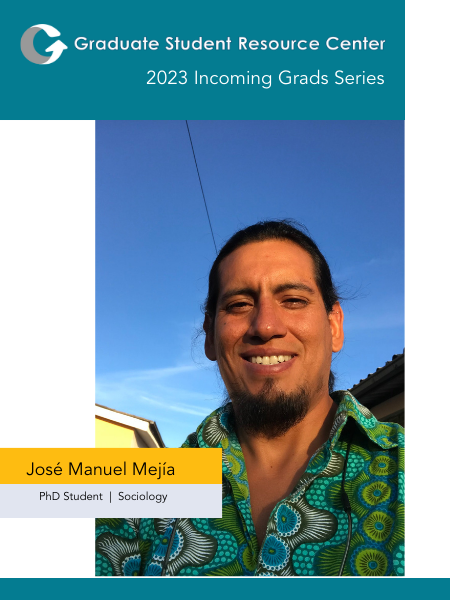Top Stories
Last up in our 2023 Incoming Grad Series is José Manuel Mejía, who will be pursuing a PhD in Sociology. Learn more about José Manuel's research on Andean mining struggles, his love of bodyboarding, and some fun facts!

We close out the 2023 Incoming Grad Series today. This series features backstories and fun facts about 8 students who are part of the entering class at UCSB.
José Manuel Mejía is entering the PhD program in Sociology. Coming from Lima, Peru, he holds a Bachelor's degree in Political Science from the Universidad Nacional Mayor de San Marcos and has two Master's degrees. Read on to learn more about his research on Andean mining struggles, his love of bodyboarding, and some fun facts!
THE STORYI grew up in the city of Lima as a third-generation immigrant of an indigenous-cholo family from the southern and central Peruvian Andes. I studied the B.A. in Political Science at the oldest university of the whole continent, the Universidad Nacional Mayor de San Marcos, founded in 1503. In 2016 I received an admission and financial aid offer to study the M.A. in Political Sociology at the Latin American Faculty of Social Science (FLACSO Ecuador). My thesis traced the scale shift process of antimining contention in the northern Peruvian Andes of Cajamarca as a hypothesis building case study. In 2019, I received another scholarship to study the M.A. in Latin American Studies at the Universidad Andina Simón Bolivar (Ecuador), in which I integrated the contentious politics approach with Marxism introducing the categories of peasantry and imperialism in the analysis of antimining struggles. Now, I will start at UCSB in the Sociology M.A./Ph.D. program to study the antisystemic effects of antimining struggles during the current crisis of global capitalism. Two weeks before I started my second M.A. in Latin American Studies at the Universidad Andina Simon Bolívar, the protests of October 2019 in Quito (Ecuador) began. Those protests made me confront directly the magnitude of repression and violence usually present in antimining struggles. Even though I couldn't understand the level of repression at that moment, I kept thinking of its connection to capital accumulation. That struggle changed me, I consequently shifted my work and reclaimed my relation with class struggle as an Andean political sociologist. The extreme situations in which some of the mobilized people, mainly students and indigenous peasants, got involved were completely unexpected (as was the brutal repression against the initial Ukrainian mobilizations of 2018), and we didn't have enough consciousness or preparation to confront those situations effectively. The frustration caused by the absolute asymmetry of the struggle between the state armed forces and unarmed masses didn't make people surrender. The scale shift process of mobilization about which I wrote in my political sociology master thesis was in operation at my face without I could open my eyes because of the expired peeper gas thrown by the police and the army, but I felt the escalation of the mobilization in my drowning and sweat, and learn about it also in the desperate and full of frustration nights after contest state violence against non-armed people for almost two weeks. As my network and involvement in social movements have expanded, so has my knowledge. I co founded the foundation Surco Común and joined the antimining struggle to articulate knowledge communities resisting in the Andes. For me, it's clear that my labor developing theory about antimining struggles must be an effective instrument for the defense of the indigenous peasantry against militarized accumulation executed by the international mining bourgeoisie as a fraction of the transnational capitalist class. |
|
WHY UCSBI have been developing a hybrid research career path for which the Sociology Ph.D. program at UCSB seems as an academic and culturally prone environment for maturation. I am particularly interested in working with Professor William Robinson and I look forward with enthusiasm to learning from his research on class struggles in Latin America and accumulation dynamics of global capitalism. Professor Robinson has followed the development of mining struggles in Peru, and I think that his proximity to the Peruvian cases of mining struggles -from which I build my current research interest in their antisystemic effects- will nurture our understanding of emerging fields of contention against the transnational capitalist class. I am also interested in working with Professor France Winddance Twine from the Race, Ethnicity, and Nation research area of the Department of Sociology (UCSB), as I am strongly motivated to rethink my research about Andean antimining struggles from a transracial perspective. I think Professor Twine's framework would allow me to approach the racial meanings within peasants' resistance against militarized accumulation, as well as develop further my thoughts about the postcolonial condition. I'm also very attracted by the philosophical instrumentation of dialectics developed by Professor Kevin B. Anderson in the construction of humanistic Marxism. |
|
| |
RESEARCH INTERESTSIn the Andean region, mining struggles are progressively configuring a strategic field of class struggle with the indigenous peasantry at the vanguard. Due to the concentration of the transnational capitalist class's productive capital in this industry, the indigenous peasantry antimining contention holds critical relevance for the development of the class struggle in the Andes, and for the sociology of antisystemic movements in the current hegemonic crisis of global capitalism. My academic path has led me to inquire about how mining struggles can obstruct the reproduction of the productive capital of the transnational capitalist class concentrated in mining industries and other new mining-dependent and highly profitable industries such as computing, information, and technology. By unpacking the strategic position of antimining struggles in the current material expansion phase for global capitalism at the final stage of the fourth systemic cycle of accumulation, I aim to contribute to the ongoing conversation of the antisystemic effects of antimining and mining struggles over capital reproduction and imperialist domination in the Andes at the current hegemonic and overaccumulation crisis of global capitalism. |
 |
FUN FACTSI have three dogs named as native trees: Capulí, Ceiba, and Higo. I love to grow fruits and vegetables, hiking, camping, fishing, swimming, biking, and cooking. I would love to be introduced to new ideas, beliefs, and experiences. I chose UCSB also for its location, the sun and the sea give me peace and I like to bodyboard a lot. |
Welcome, José Manuel!
Be sure to subscribe to the GradPost and check out the other profiles in our Incoming Grad Series.